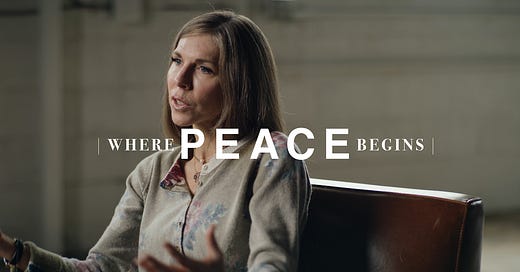Truth in Conflict, with Jennifer Finlayson-Fife
In our third video of "Where Peace Begins", Dr. Jennifer Finlayson-Fife shares how she and her sister healed their relationship after years of emotional distance.
"And why do you look at the speck in your brother’s eye, but do not consider the plank in your own eye?” Matthew 7:3
As a therapist and relationship expert, Dr. Jennifer Finlayson-Fife has long taught that love and truth come together. In an essay called “Facing Truth”, Jennifer writes:
“Our capacity for intimacy, to know and be known, is highly linked to our willingness to honestly confront who we are, and who we are not yet. Facing this head on takes tremendous courage, but in my experience, these are the people who live more peacefully in their relationships.”
In this video, “Truth in Conflict”—we hear from Jennifer Finlayson-Fife about how she and her sister healed their relationship after years of emotional distance. The distance was sustained for years by partial truths they were hanging on to; both of them could see ways the other person was in the wrong, or was being unfair. While they weren’t technically incorrect, it is only when they moved towards acknowledging the other person’s perspective—the truth they had been avoiding—that the possibility for genuine trust and closeness returned.
Putting ideas into action
After watching Jennifer’s video, think of a conflict you are having in your life. Use the following exercise to consider how truth can bring back closeness and understanding.
Think through your explanation of the conflict, and the other person’s explanation of the conflict. Where do your stories align, and where do they diverge? How do you both characterize the other?
Consider the exercise that Jennifer went through in the video: If points B, C, D, and E of the other person’s explanation feel false, but A feels correct, focus on A instead of B, C, D, or E. Where is the other person correct, and inviting you to see truth?
Think of how you can communicate to the other person that you acknowledge A without justification. Don’t provide excuses or a long explanation that lessens our responsibility. Own it. Say, “I can see how my [words, actions, etc.] have caused you pain. I am so sorry.”
Offer to change. Offer to fix the mistake that you make. Give them a reason to trust that what has happened in the past won’t happen again.
If after doing all of this, the person you are in conflict with refuses to acknowledge their mistakes, offer grace instead of condemnation.
Dr. Jennifer Finlayson-Fife is a licensed therapist, coach, and educator specializing in relationships and sexuality, particularly within the context of the Church of Jesus Christ of Latter-day Saints. She earned her Ph.D. in Counseling Psychology from Boston College, where her research focused on women's sexual agency in conservative religious cultures. Through her private practice, online courses, workshops, and podcast, Dr. Finlayson-Fife helps individuals and couples develop emotional and sexual resilience by fostering greater self-awareness, authenticity, and connection. Her work addresses cultural and psychological barriers to intimacy, encouraging a deeper integration of spirituality and desire.






Thanks Jennifer for your insight in this topic and for sharing your personal experience. I love the simplicity of your model, address the points of conflict that are true. I can use this in my life.